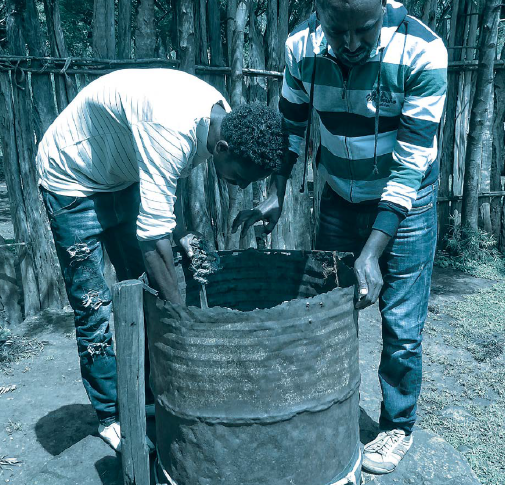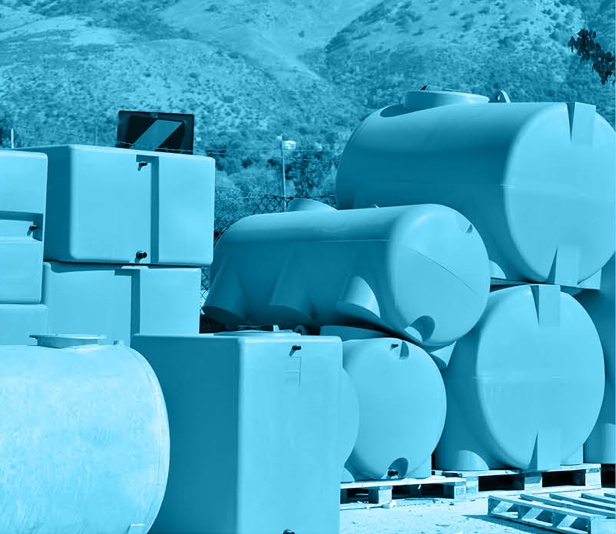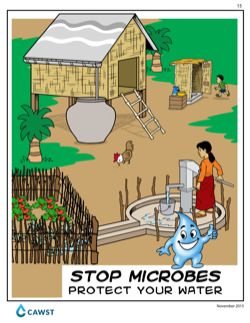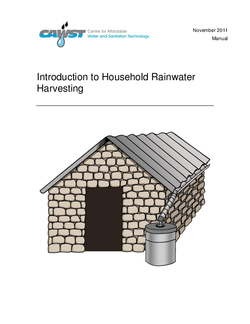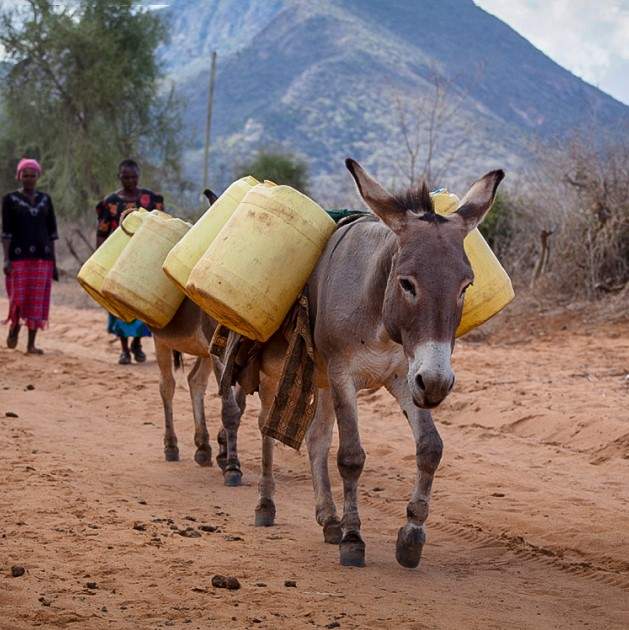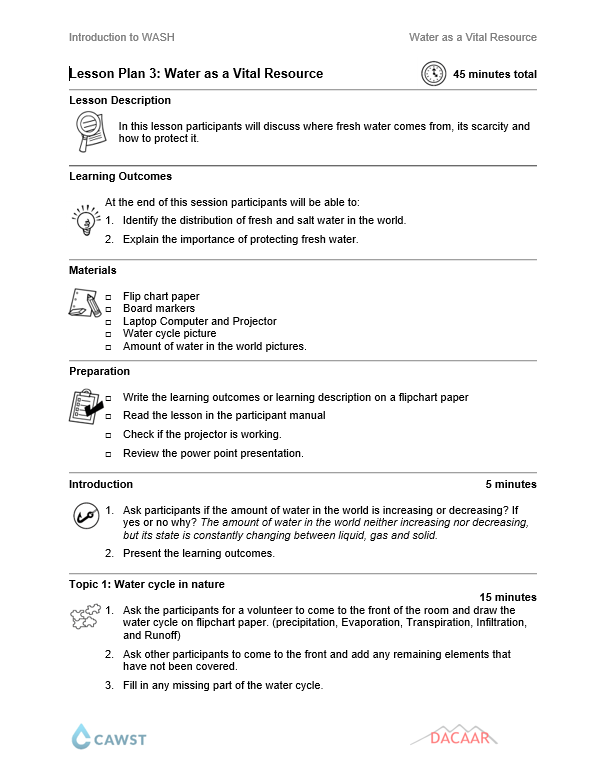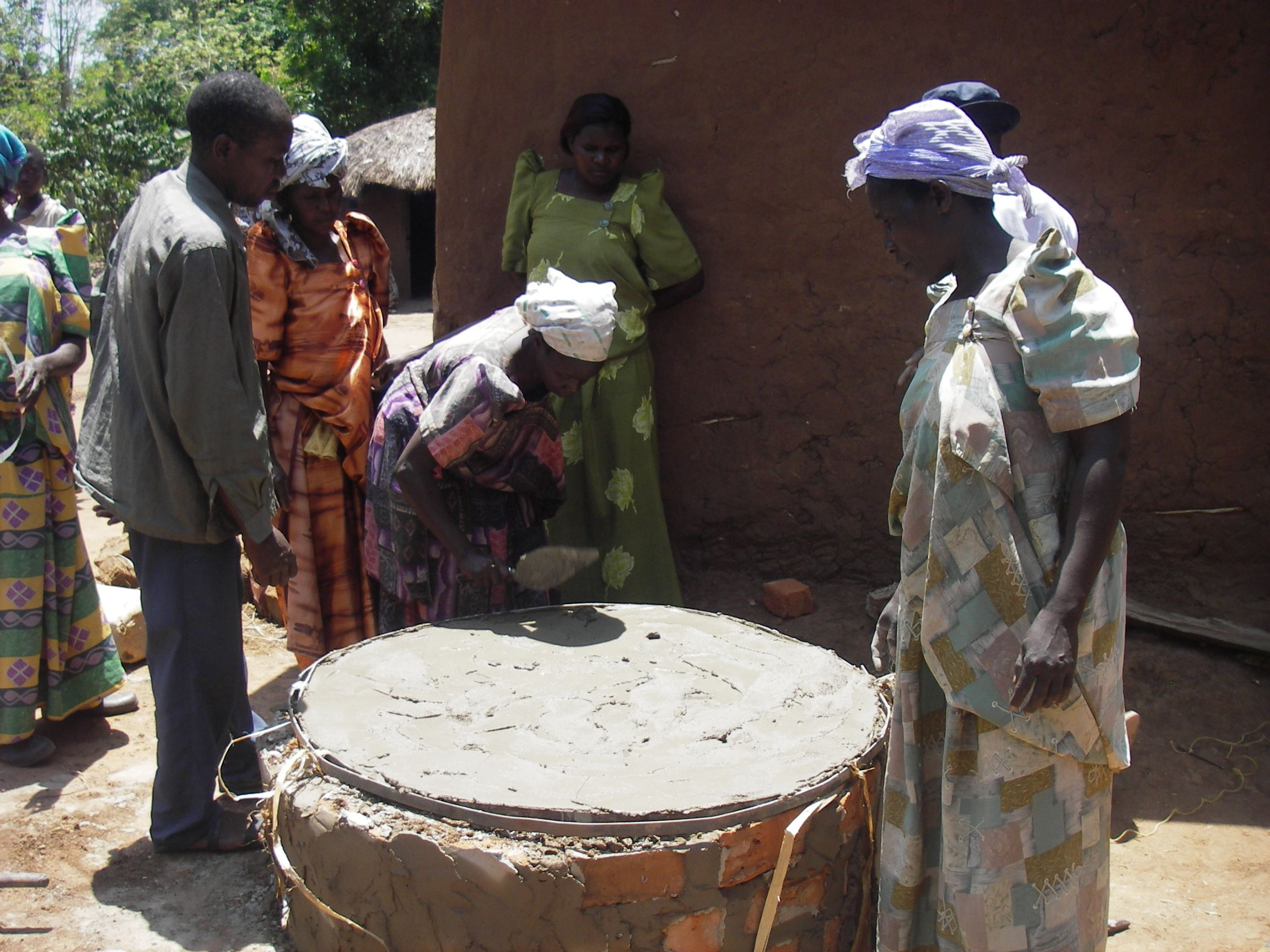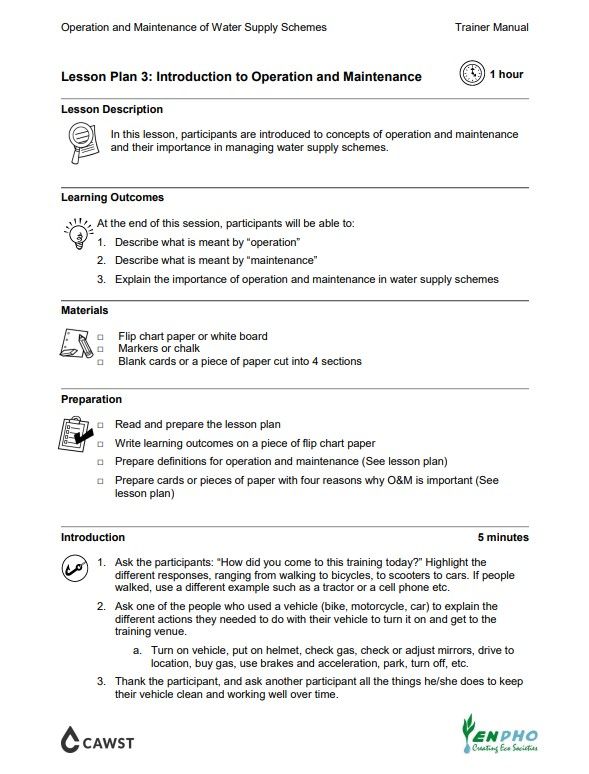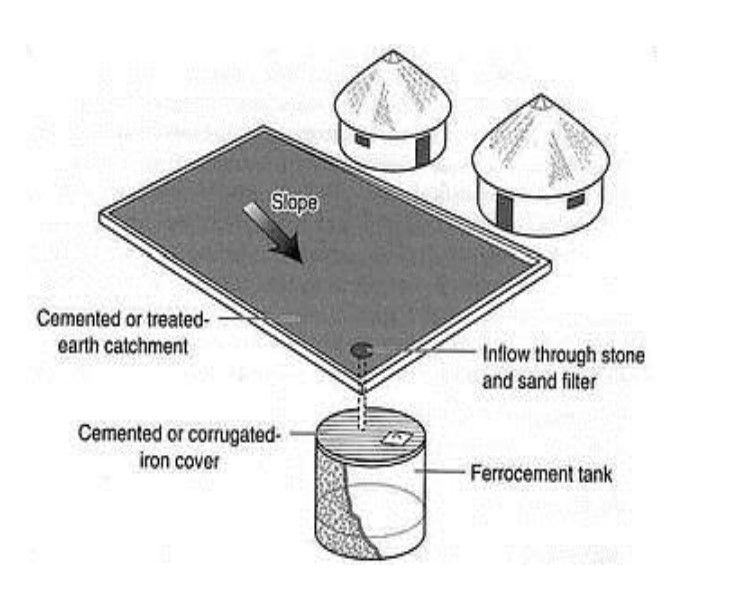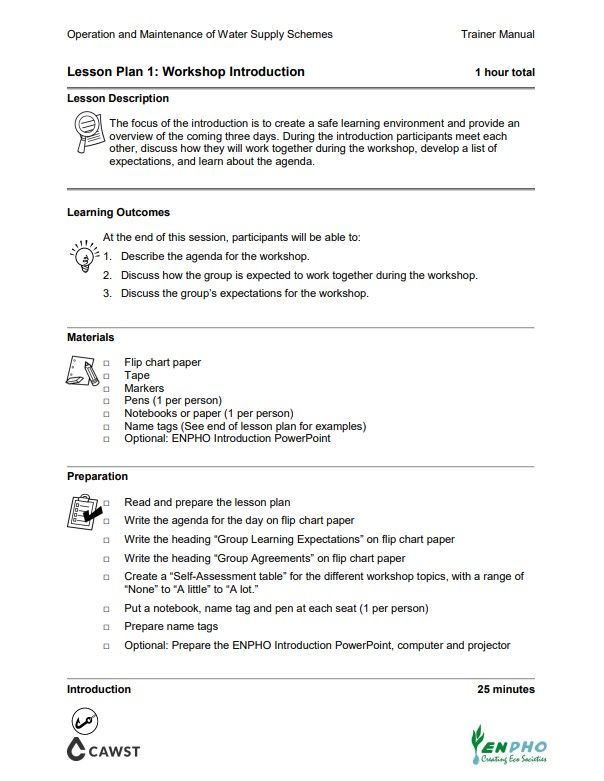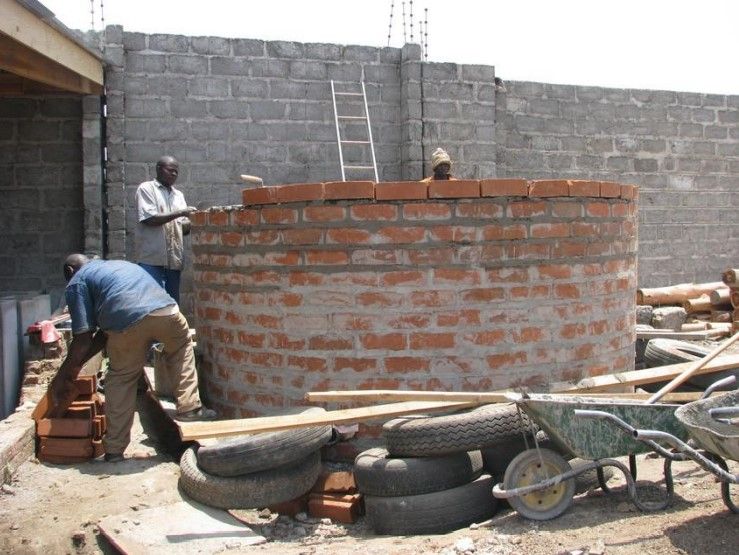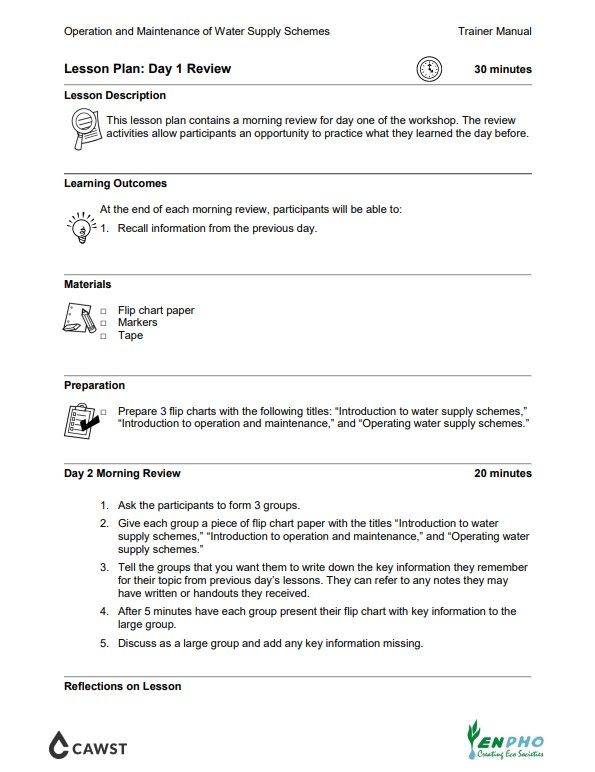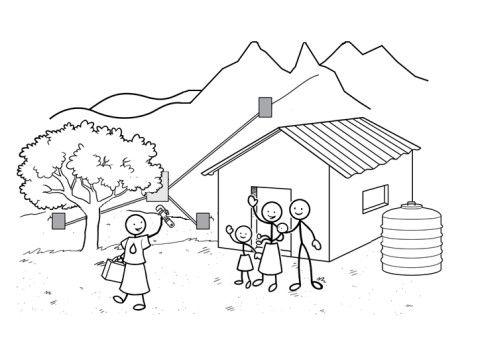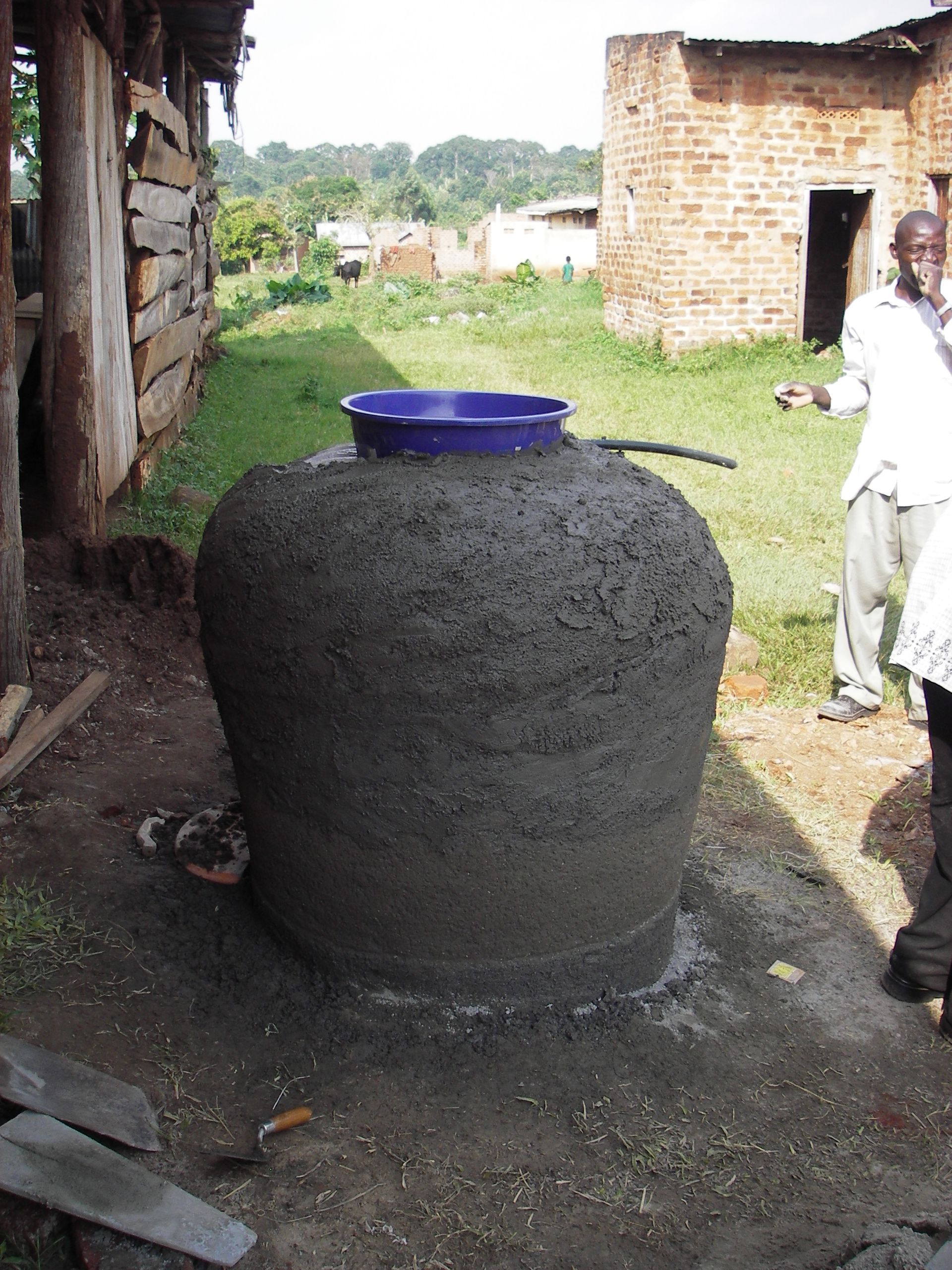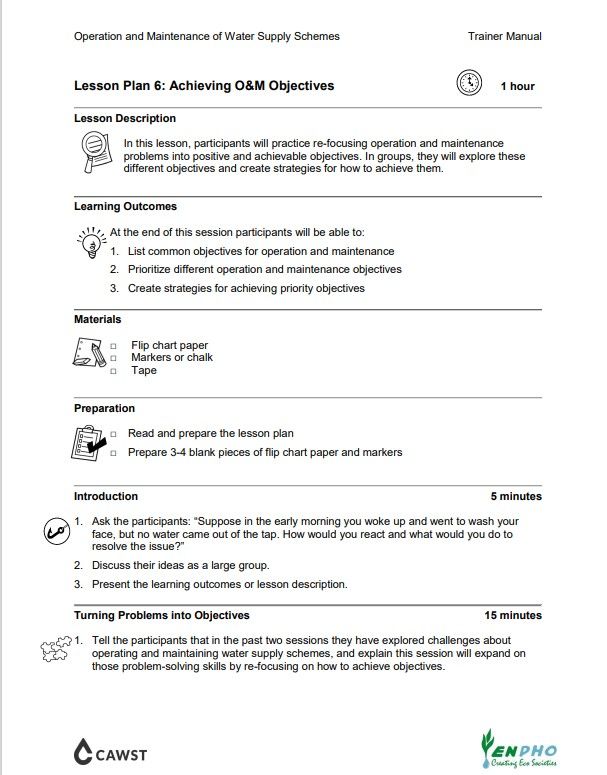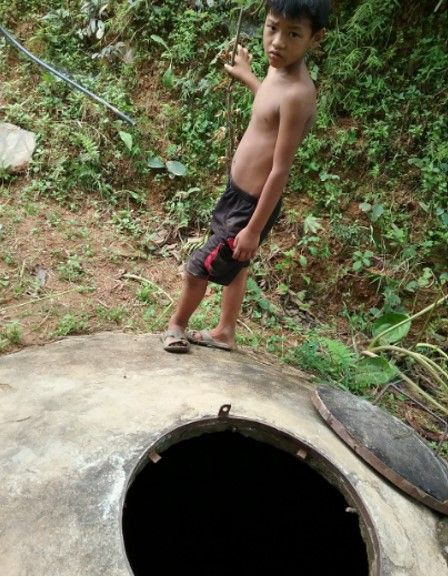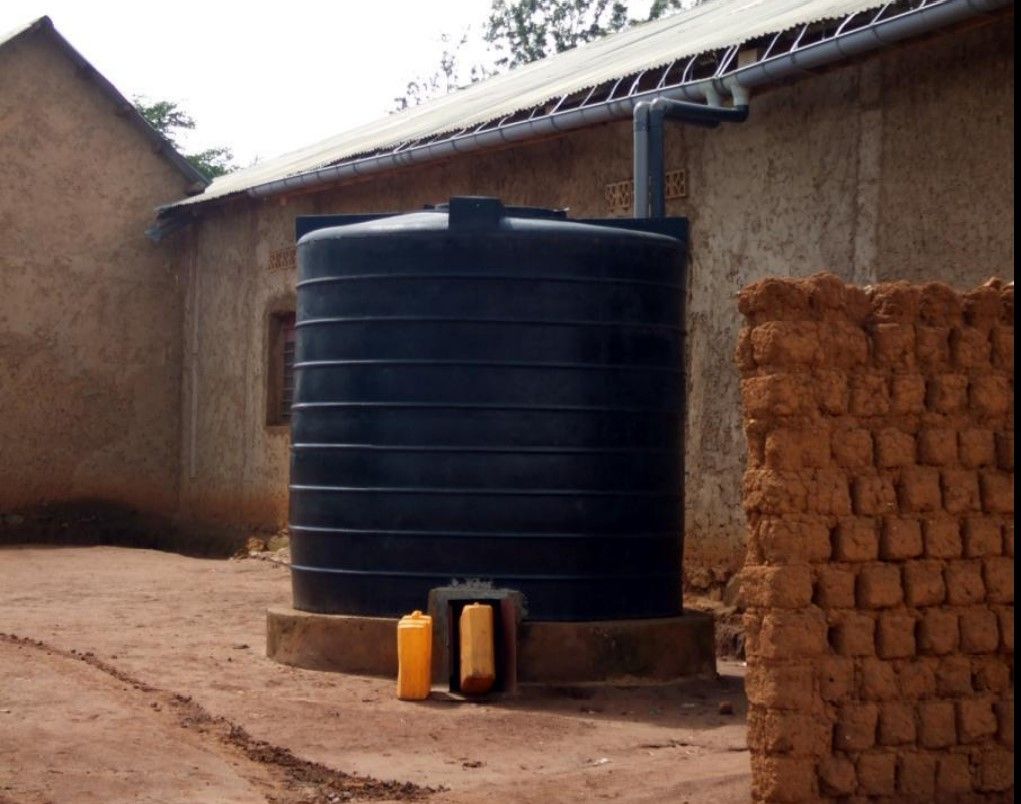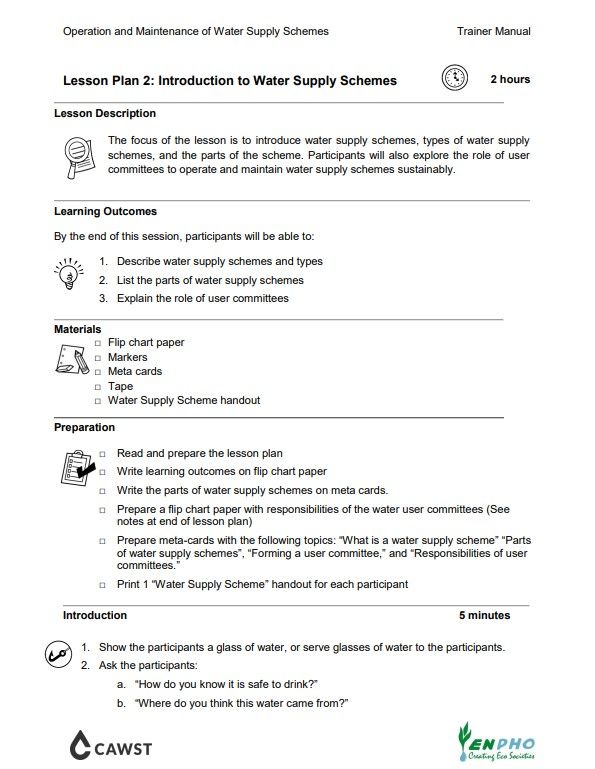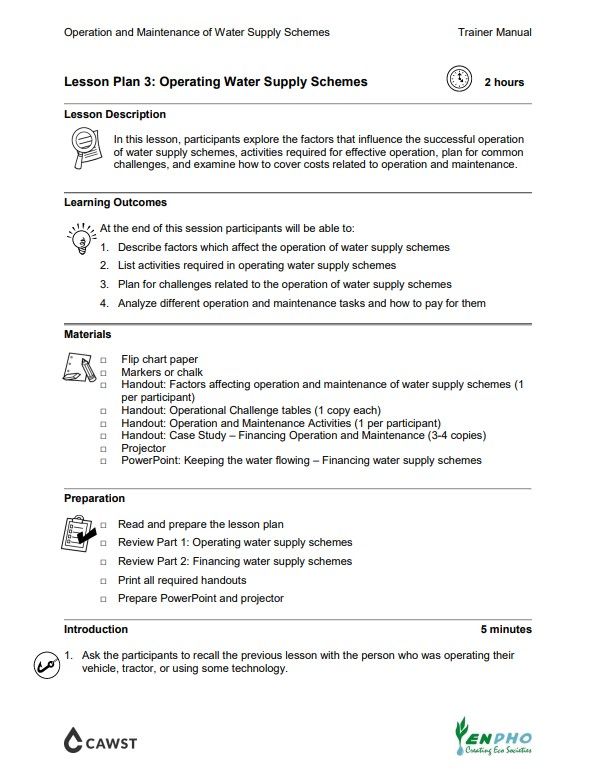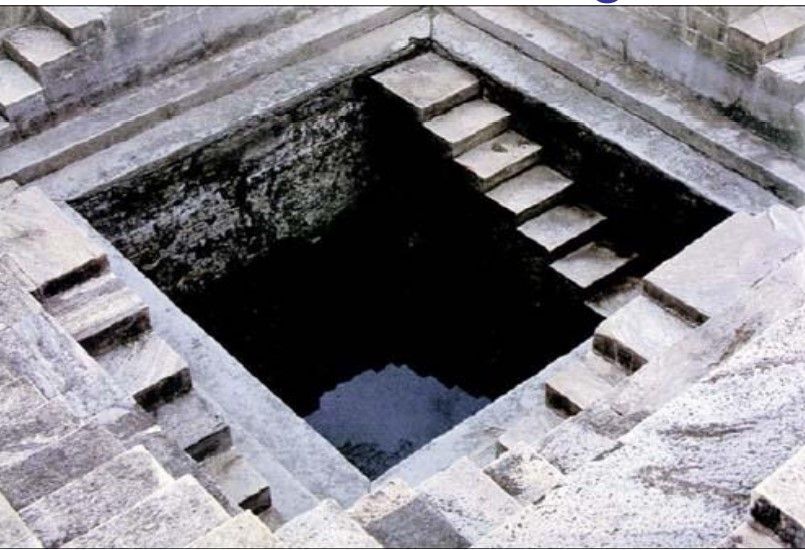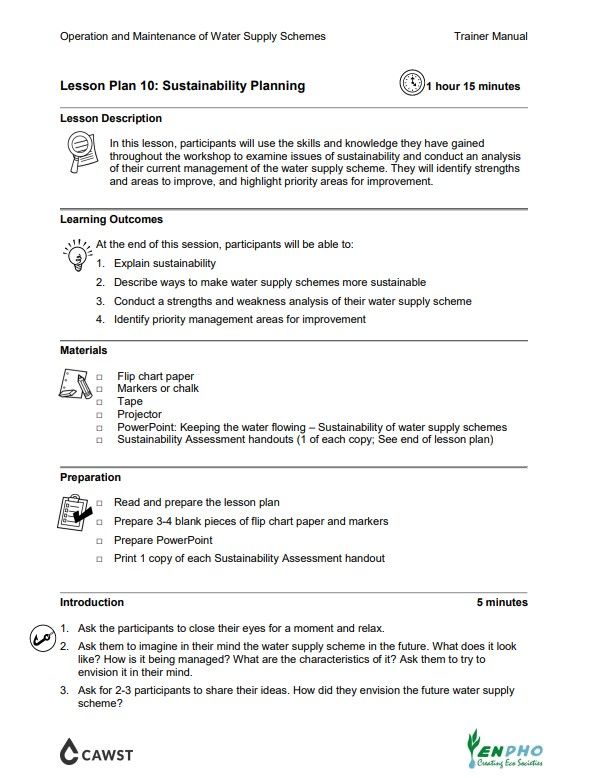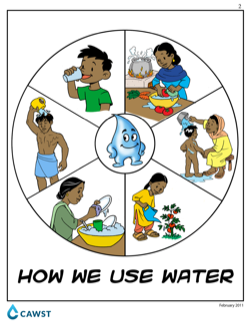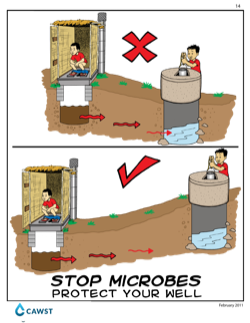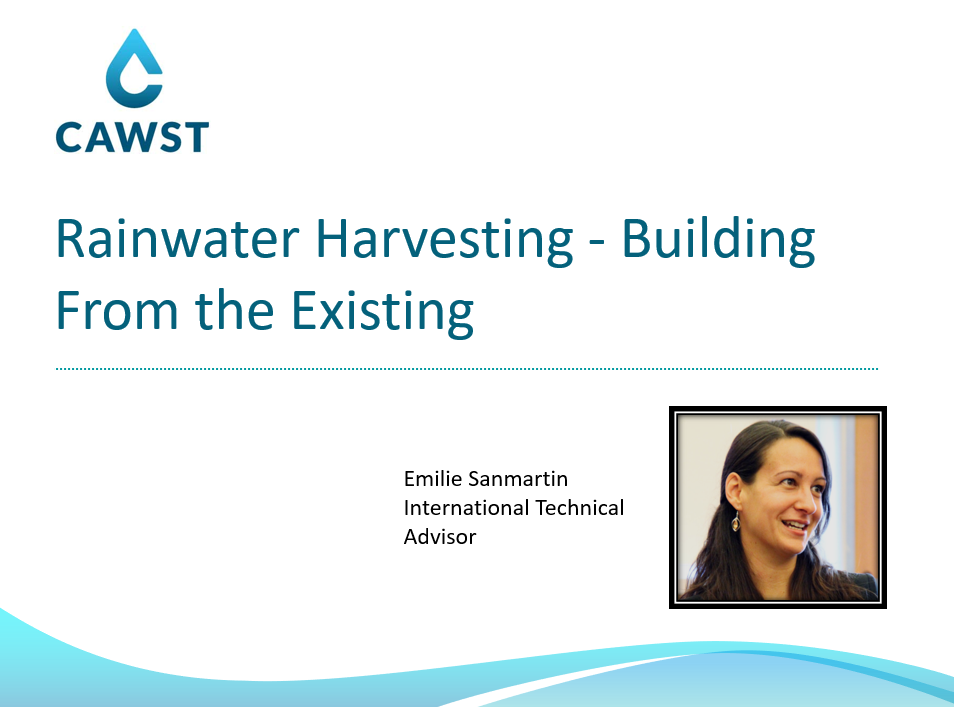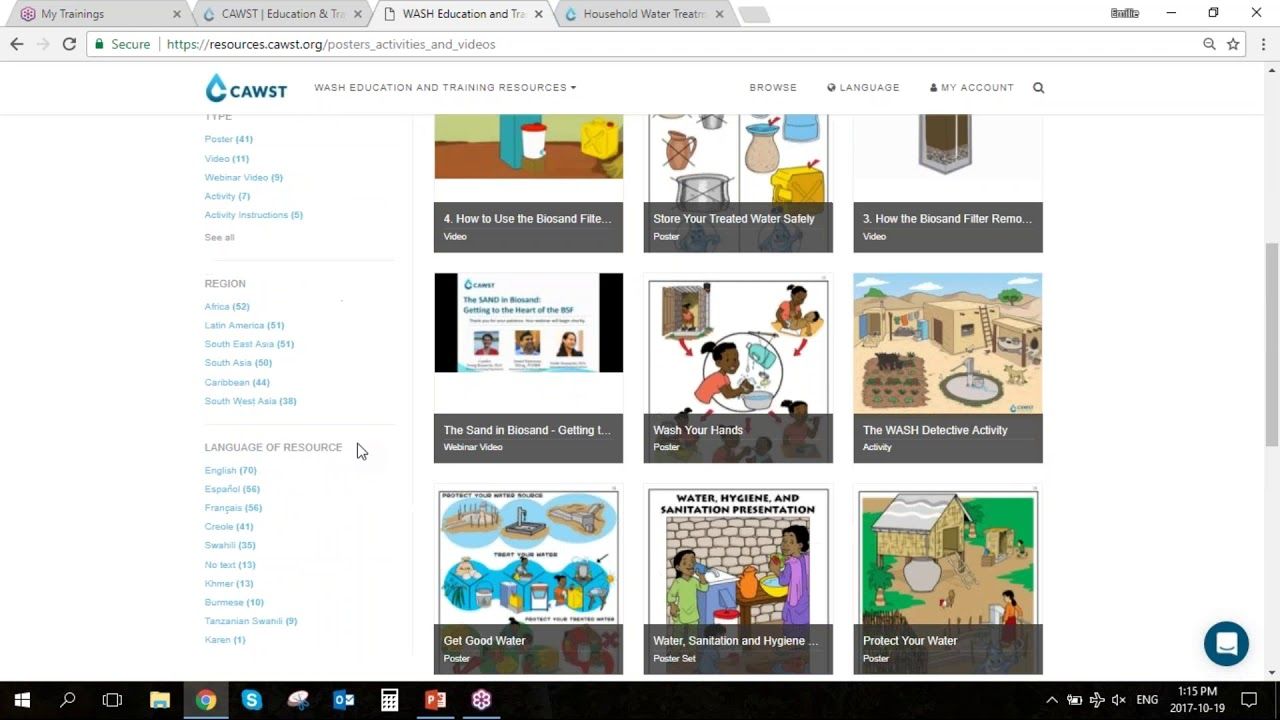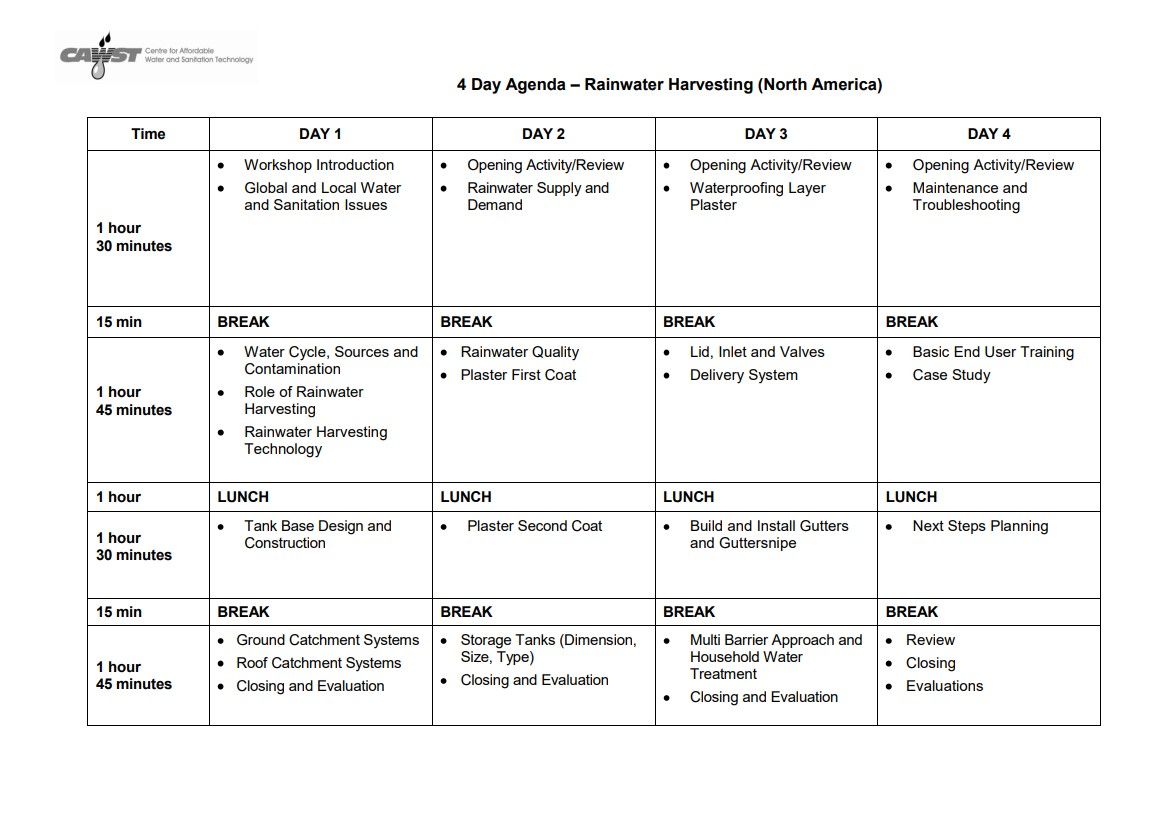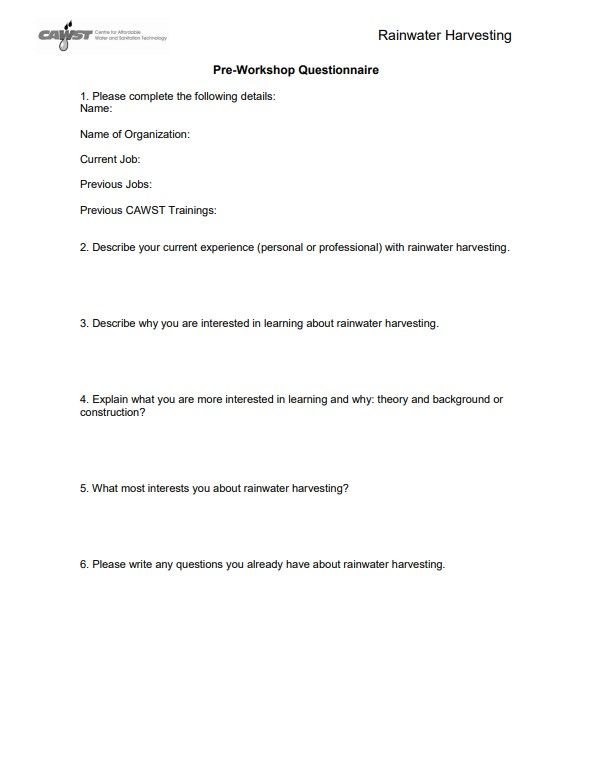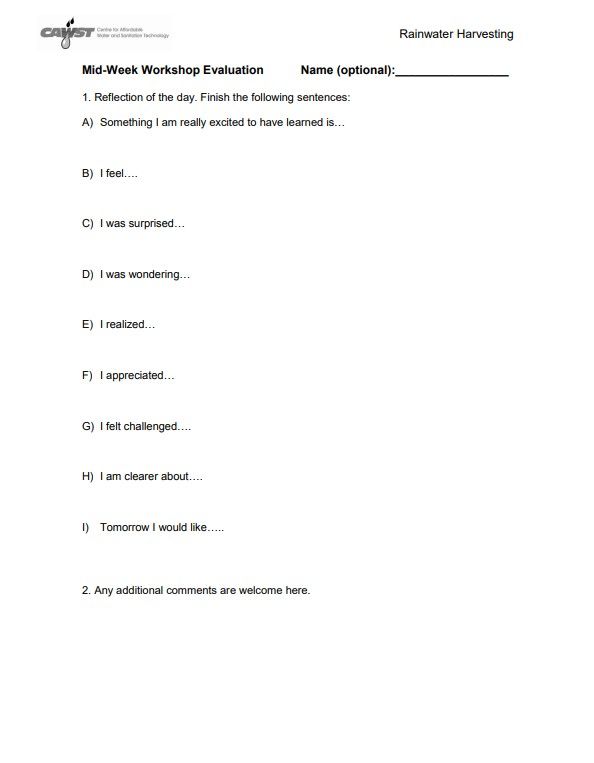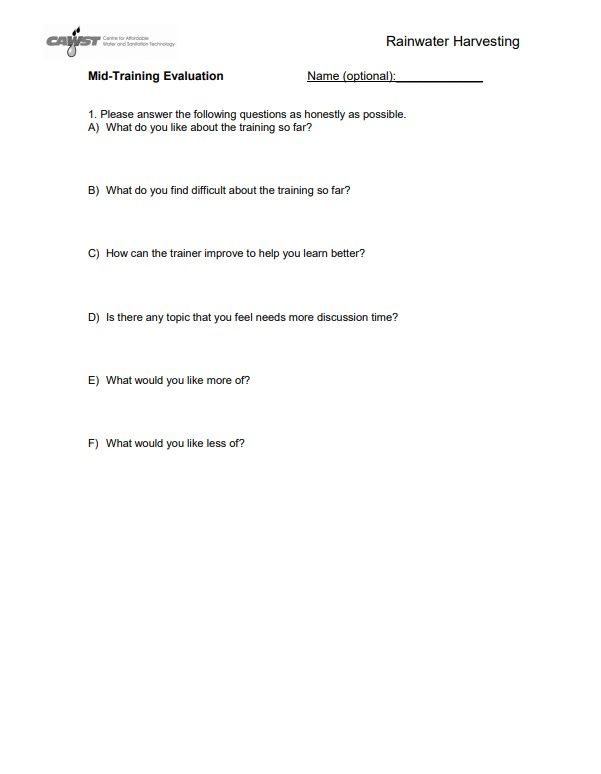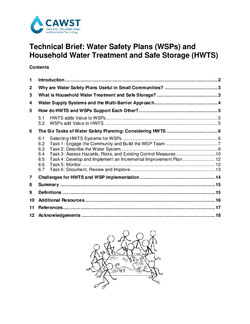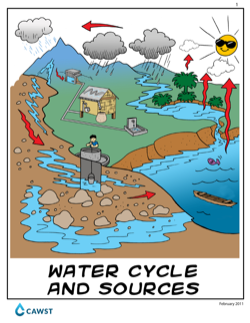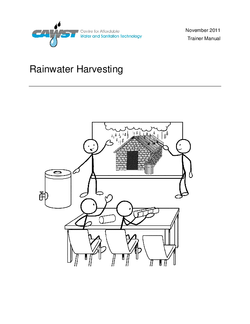Explore Water Supply
Chlorine Dose Calculator: Shock Chlorination of Wells
Use this calculator to determine the amount of chlorine product needed to prepare a 1% chlorine solution and the amount of the 1% solution required to to disinfect hand-dug wells and boreholes.
Languages
English
French
Spanish
Arabic
Portuguese
Chlorine Dose Calculator: Shock Chlorination of Tanks
Use this Excel calculator to determine the amount of chlorine required to disinfect storage tanks and tankers through shock chlorination. This method is recommended for new tanks or when there is evidence of microbial contamination.
Languages
English
Spanish
French
Arabic
Portuguese
Source Water Protection
What influences the quality of water sources? How do you identify the best possible water source for your household or the households you serve? Be a WASH detective to find key sources of contamination and how to prevent them.
Languages
English
French
Spanish
Protect Your Water
There are ways to protect water from contamination (watershed and water source protection, protected well, proper rainwater storage, good wastewater disposal).
Languages
Spanish
English
Swahili
Haitian Creole
French
Wayuu
Learn About Household Water Treatment
Wondering how you can provide safe drinking water in homes, schools and clinics in your community? Household Water Treatment and Safe Storage (HWTS) is a simple and effective solution. Find all the basics to get started here!
Languages
English
Spanish
French
Arabic
Hindi
Household Water Treatment and Safe Storage Workshop
This collection contains the resources for both trainers and participants for the Household Water Treatment and Safe Storage workshop. This two to three day workshop provides an introduction to drinking water quality, the Multi-Barrier Approach to safe drinking water, household water treatment and safe storage (HWTS) options, behaviour change, and implementation best practices. The intended participants are people responsible for making decisions about HWTS selection and implementation.
Languages
French
Spanish
English
Arabic
Hindi
Introduction to Rainwater Harvesting Manual
This manual is for project implementers interested in doing a rainwater harvesting project.
Languages
English
French
Spanish
Safe Water Transportation
In this interactive module, learn how to ensure water stays safe on its journey from the source to its point of use.
Languages
English
French
Spanish
Water as a Vital Resource - Lesson Plan (Intro to WASH)
In this lesson participants will discuss where fresh water comes from, its scarcity, and how to protect it.
Languages
English
Maintaining Water Supply Schemes - Lesson Plan (O&M Nepal)
In this lesson, participants learn about different types of maintenance and explore the activities necessary to maintain water supply schemes over time. Participants will also create a plan for maintenance activities.
Languages
English
O&M of Water Supply Schemes Nepal Participant List
This participant list template is a tool that will help you keep a database of participant information for your Operation & Maintenance of Water Supply Schemes in the context of Nepal workshop.
Languages
English
Roof Catchments Presentation (RWH)
This presentation describes roof catchment systems and how to calculate your runoff coefficient
Languages
English
Rainwater Harvesting Final Evaluation
This evaluation is to be handed out at the end of the workshop to give the trainer constructive feedback on the workshop
Languages
English
Spanish
French
Operating Water Supply Schemes - Presentation (O&M Nepal)
This presentation is used to support the Operating Water Supply Schemes Lesson Plan (O&M Nepal). It addresses financing operation and maintenance of water supply schemes.
Languages
English
O&M of Water Supply Schemes Nepal 3 Day Agenda for Participants
This is the basic 3-day agenda for participants attending the Operation & Maintenance of Water Supply Schemes in the context of Nepal workshop.
Languages
English
Practicing O&M Skills - Presentation (O&M Nepal)
This presentation is used to support the Practicing Operation & Maintenance Skills Lesson Plan (O&M Nepal). It covers using the ENPHO Water Testing Field Kit.
Languages
English
Intro to Operation & Maintenance - Lesson Plan (O&M Nepal)
In this lesson, participants are introduced to concepts of operation and maintenance and their importance in managing water supply schemes.
Languages
English
Ground Catchments Presentation (RWH)
This presentation shows examples of ground catchment options
Languages
English
Workshop Introduction - Lesson Plan (O&M Nepal)
The focus of the introduction is to create a safe learning environment and provide an overview of the coming three days. During the introduction participants meet each other, discuss how they will work together during the workshop, develop a list of expectations, and learn about the agenda.
Languages
English
O&M of Water Supply Schemes Nepal Workshop Outline
This outline describes the content, objectives, and audience for the Operation & Maintenance of Water Supply Schemes in the context of Nepal workshop.
Languages
English
Day 1 Closing - Lesson Plan (O&M Nepal)
This lesson plan contains a review for day one of the workshop. The review activities allow participants an opportunity to practice what they learned during the day.
Languages
English
Operation & Maintenance of Water Supply Schemes Nepal Trainer Manual
This manual is for trainers who are interested in delivering training on Operation & Maintenance of Water Supply Schemes in the context of Nepal. It includes lesson plans, agendas, forms, and guidance on training delivery.
Languages
English
O&M of Water Supply Schemes Nepal Final Evaluation Summary
This is a template for displaying the final results of your participant evaluations for the Operation & Maintenance of Water Supply Schemes in the context of Nepal workshop.
Languages
English
Role of RWH Presentation (RWH)
This presentation describes the pros and cons of rainwater harvesting
Languages
English
Rainwater Harvesting Final Evaluation Summary
This is a template of how to display the results of your final evaluations
Languages
English
Achieving O&M Objectives - Lesson Plan (O&M Nepal)
In this lesson, participants will practice re-focusing operation and maintenance problems into positive and achievable objectives. In groups, they will explore these different objectives and create strategies for how to achieve them.
Languages
English
Sustainability Planning - Presentation (O&M Nepal)
This presentation is used to support the Sustainability Planning Lesson Plan (O&M Nepal). It addresses planning for the sustainability of water supply schemes.
Languages
English
Practicing O&M Skills - Lesson Plan (O&M Nepal)
This lesson focuses on the introduction of tools and fittings for operation and maintenance activities of water supply schemes. It allows participants hands-on practice to make or adapt locally available HDP fittings and thread cutting of GI pipe.
Languages
English
Link to WASH - Lesson Plan (O&M Nepal)
The lesson plan focuses on the importance of WASH for community health, its link to the water supply scheme, and the role of the water supply user committee in advocating for better WASH practices. Participants will also understand disease transmission routes and the link between WASH practices.
Languages
English
Rainwater Harvesting 5 Day Workshop Agenda
This agenda lays out how to run a 5 day workshop using the lesson plans and presentations provided targeting a developing country audience
Languages
English
French
Spanish
Delivery System Presentation (RWH)
This presentation shows pictures of rainwater harvesting options
Languages
English
Intro to Water Supply Schemes - Lesson Plan (O&M Nepal)
The focus of the lesson is to introduce water supply schemes, types of water supply schemes, and the parts of the scheme. Participants will also explore the role of user committees to operate and maintain water supply schemes sustainably.
Languages
English
Operating Water Supply Schemes - Lesson Plan (O&M Nepal)
In this lesson, participants explore the factors that influence the successful operation of water supply schemes, activities required for effective operation, plan for common challenges, and examine how to cover costs related to operation and maintenance.
Languages
English
Learn About Drinking Water Treatment for Emergency Contexts
A collection of short e-learning tools and job aids to help water technicians treat, disinfect and safely handle drinking water under field conditions.
Languages
English
French
Spanish
Arabic
Portuguese
Hindi
Rainwater Harvesting Technology Presentation (RWH)
This presentation describes the two methods of rain water harvesting and the components of any rainwater harvesting design
Languages
English
Maintaining Water Supply Schemes - Presentation (O&M Nepal)
This presentation is used to support the Maintaining Water Supply Schemes Lesson Plan (O&M Nepal). It addresses identifying maintenance issues with water supply schemes.
Languages
English
Sustainability Planning - Lesson Plan (O&M Nepal)
In this lesson, participants will use the skills and knowledge they have gained throughout the workshop to examine issues of sustainability and conduct an analysis of their current management of the water supply scheme. They will identify strengths and areas to improve, and highlight priority areas for improvement.
Languages
English
Rainwater Harvesting Workshop
This collection contains the resources for both trainers and participants for the Rainwater Harvesting workshop. This four-five day workshop is designed for organizations and individuals interested in starting a rainwater harvesting program. The workshop offers instruction on the concept and technology of rainwater harvesting for domestic use and how it fits into the overall picture of appropriate rural and urban water supply in developing countries. Topics to be addressed include water supply and demand, selection of appropriate rainwater harvesting technology, and the basic construction, installation, operation and maintenance of roof top and surface catchments.
Languages
English
French
Spanish
O&M of Water Supply Schemes Nepal (O&M Nepal) Workshop
These workshop materials contain the resources for the Operation & Maintenance of Water Supply Schemes in the context of Nepal workshop. This workshop has been designed to address common issues of performance, efficiency, and sustainability of rural water supply services, and incorporates technical and managerial sessions to support and provide guidance for local authorities.
Languages
English
Introduction to WASH
This is an introductory level workshop that was co-developed with our partners in Afghanistan at DACAAR. This workshop is for those who are just starting to work in the Water, Sanitation, and Hygiene sector. It covers the basic of WASH which include topics of disease transmission, household water treatment, solid waste management, vector control, sanitation, hygiene, and behaviour change.
Languages
English
How We Use Water
Good water is important for many uses in our life (drinking, cooking, washing dishes, growing plants/crops, laundry, bathing).
Languages
English
Swahili
Spanish
French
Haitian Creole
Protect Your Well
Keep your well safe by placing your latrine downhill and far away from your well.
Languages
English
Spanish
Haitian Creole
French
Swahili
Rainwater Harvesting - Building From the Existing
Explores different ways to access the existing potentials to start or re-start a RWH project
Languages
English
Handpump Repair Zambia Trainer Manual
This trainer’s manual is to support people who facilitate the Hand Pump Repair workshop. It provides background on how and why the workshop was developed, tips that help you plan for a successful workshop, and several tools to help deliver your training, such as checklists, lesson plans and participant activities.
Languages
English
Water for Life: Improving Access to Drinking Water on Pacific Islands
On the Pacific Islands, fresh water is scarce. Rainwater is a main water source of drinking water and other critical needs. This session will address how reliable, sustainable supplies of quality, drinkable rainwater can be achieved in an economically feasible fashion.
Languages
English
Biochar Adsorbent for Control of Synthetic Organic Contaminants in Affordable Decentralized Water Treatment
The public health consequences of chemical exposure are now comparable to or greater than those of widespread infectious diseases such as HIV/AIDS, tuberculosis, and malaria. However, despite large human and economic costs, chemical pollution of the environment and water sources has been overlooked in the WASH development agenda. Chemical pollution control currently receives less than 0.5% of global development spending. Biomass char (biochar) has shown promise as a low-cost adsorbent for uptake of SOCs from drinking water that can be generated using local resources in developing communities.
Languages
English
Ecofiltro - Selling Water Filters in Mexico and Central America: success reached by failing fast!
Ecofiltro is a social enterprise that set a goal in 2010 of reaching 1 million families in rural Guatemala with a clean water solution by the year 2020. A cross subsidy strategy was setup whereby urban filters were used to subsidize rural sales. From the beginning, the rural poor were viewed as potential customers as opposed to objects of pity. A low price point was set to make the water filters very attractive by having a 3 month or less payback. The strategy started with a focus on community entrepreneurs as primary sales agents and has evolved to making schools in the countryside the main channel to selling filters to parents of school children. Financing models were setup and tweaked and today Ecofiltro has reached over 250,000 paying customers in rural Guatemala. The model is now being exported to Mexico and the rest of Central America.
Languages
English
O&M of Water Supply Schemes Nepal Final Evaluation
This is the final evaluation template for participants to provide feedback after a Operation & Maintenance of Water Supply Schemes in the context of Nepal workshop.
Languages
English
Workshop Closing - Lesson Plan (O&M Nepal)
In the workshop closing, participants review what they learned and evaluate the workshop. The final closing is an opportunity to consolidate participants’ learning, gather feedback and celebrate successes.
Languages
English
Rainwater Harvesting 4 Day Workshop Agenda
This agenda lays out how to run a 4 day workshop using the lesson plans and presentations provided targeting a North American audience
Languages
English
Spanish
French
Rainwater Harvesting Pre Workshop Questionnaire
This questionnaire gives the trainer an understanding of who the participants are and their level of knowledge on the topic
Languages
French
Spanish
English
Rainwater Harvesting Midweek Workshop Evaluation
This evaluation gives the trainer feedback mid way through the training in order to help the trainer better prepare and create relevant sessions
Languages
French
English
Spanish
Rainwater Harvesting Day 1 Training Evaluation
This questionnaire gives the trainer feedback mid way through the training in order to help the trainer better prepare and create relevant sessions
Languages
Spanish
English
French
Data to Drops: Leveraging Water Point Data for Improved Decisions
This session will look at how governments, civil society organizations, donors, and other stakeholders can maximize the impact of water point mapping. From planning water point mapping activities, to sharing the data, to analyzing the information and taking action, this session will look at best practices, opportunities, and future trends. Participants will get to learn about the state of the art in increasing the value of water point data through a presentation by the Water Point Data Exchange, and then have an opportunity to participate in a virtual discussion on next steps.
Languages
English
Water Safety Plans (WSPs) and Household Water Treatment and Safe Storage (HWTS) Technical Brief
This Technical Brief introduces the importance of water safety planning for small communities. It describes the benefits of including household water treatment and safe storage (HWTS) in a water safety plan (WSP), and explains how the WSP approach can improve HWTS implementation. It also provides an overview of the six water safety planning tasks for small communities, with considerations for integrating HWTS throughout the tasks.
Languages
Spanish
English
French
Household Rainwater Harvesting Workshop Outline
This outline describes the content, objectives and audience for CAWST's workshop: Introduction to Rainwater Harvesting.
Languages
English
Spanish
Water Cycle and Sources
Water is in continuous movement on, above, and below the surface of the Earth. Drinking water comes from three main sources (rainwater, groundwater, surface water).
Languages
English
Spanish
French
Haitian Creole
Swahili
Rainwater Harvesting Trainer Manual
This manual is for trainers who are interested in delivering training on rainwater harvesting--what it is, the options available and how to implement a rainwater harvesting project. It includes lessons plans and guidance on training delivery.
Languages
English
Rainwater Harvesting Workshop Outline
This workshop outline contains a workshop description, objectives, audience, content and training materials needed for this workshop
Languages
French
Spanish
English
Water, Sanitation and Hygiene Poster Set
This poster set includes water, sanitation and hygiene (WASH) posters to teach about good WASH practices, including household water treatment technologies.
Languages
English
Khmer
Swahili
French
Haitian Creole
Spanish
Wayuu
About CAWST
CAWST is a Canadian charity and licensed engineering firm. We address the global need for safe drinking water and sanitation by building local knowledge and skills on household solutions people can implement themselves.
